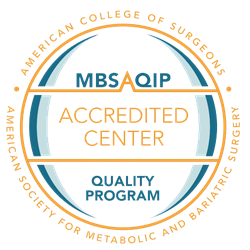
Learn more about weight loss surgery at Rocky Mountain Associated Physicians www.RMAP.com (801) 268-3800
It is understandable why a bariatric patient might live in fear and dread of weight regain. Many patients have reported that at least a little bit of hunger creeps back into their lives a year or more out from surgery. Old cravings may pop up, undesired habits may try to sneak back into your daily routines. It is a critical time to re-commit to the healthy behaviors that brought on the success of your weight loss journey.
Many patients are highly motivated in the initial 2-year postoperative period due to how quickly the patient lost weight. When you reach a certain weight and maintenance is your goal, you may need to reassess your motivation to challenge the “obesogenic” environment in which you live.
Having the knowledge and understanding that it is natural for the body to regain some weight after bariatric surgery will help you understand and have realistic expectations that many individuals don’t lose 100% of their excess weight. It is common to see a 10-20% weight regain after you have reached maintenance, this may become a new “stable” weight.
However, the good news is that the weight loss you experience as a result of surgery CAN last a lifetime. But it is essential that your entire lifestyle changes, not just a few eating habits. There are several solutions and ways to help with weight regain and getting back on track!
Ways to Help with Weight Regain
- Do not React, Act: Slow your thought process. Take the time to talk with a friend, provider, and/or therapist to create rational, realistic, and achievable goals and a course of action based on facts and knowledge instead of emotions.
- Reassess Your Priorities: Instead of focusing on only being “skinny,” make health your weight management priority. Have a goal to be a healthier you, not necessarily the lowest weight or ideal weight determined by what you see in others.
- Keep Learning: There are hundreds of articles and books highlighting the topic of “Weight Maintenance.” The bariatric world is continually being studied. Taking the time to stay up to date on the facts and educating yourself can help you understand the changes in your body.
- Remind Yourself of Your “Why”: Ask yourself why you started on this journey in the beginning. What made you want to change your habits and lifestyle and what was the recision that drove you to decide to have bariatric surgery? Ask yourself if what you are doing today is getting you closer to where you want to be tomorrow.
- Change Your Mindset: Weight loss takes time, just as weight gain does not happen overnight. Have honest conversations with yourself, friends and family, your providers, and therapists about your behaviors and habits, and adjust accordingly. Avoid the “all-or-nothing” way of thinking. “Just this once” could turn into more than you bargained with yourself.
- Nutritional Therapy: Track what you eat and go back to the 70/30 rule. 70% protein and 30% vegetables. Increase your water intake, cut out all sugars (fruits, fruit juices, cookies, candies, sweets), and lower your carbohydrate intake (bread, pasta, rice, chips, potatoes, tortillas, crackers). Remember to eat slowly and chew your food well. You should not be eating more than 6-8 ounces per meal. If you need more help, give our office a call at (801) 268-3800 we can refer you to nutritionists and dieticians.
- Move Your Body: It is also especially important to make sure that you are moving your body at any chance! Not only will it help with weight maintenance, but it can help with many chronic diseases such as:1
- High blood pressure
- Risk of heart attack, stroke, and several forms of cancer
- Arthritis pain and associated disability
- Osteoporosis and falls
- Symptoms of depression and anxiety
You should be exercising 30-60 minutes a day depending on the type of exercise you are doing.
- Revisional Surgery: Revisional surgery may be an option, after collaborating with a clinical dietician for at least six months with the goal to get you back on track and document your efforts to make significant lifestyle and dietary changes. Have your dietician/primary care physician send us a referral with your documentation for our surgeons to review to see if you are a candidate for revision surgery. Revision surgery is considered “high-risk” and should only be considered as a final course of action. This should be discussed thoroughly with your surgeon.
Fear can either drive you and motivate you, or it can cripple you and lead you to believe in your failure. It is your choice how to use it when weight regain comes to thought. You can use it for self-awareness instead of self-destruction by always remembering that you are a bariatric patient. You do not need to let that term define you by any means as a person, but use it to identify where you were, where you went, and where you want to be, physically and mentally healthy by your standards.
Keep in mind that it is important to have realistic goals and think of long-term success!
“Bariatric surgery procedures are merely tools and not the solution. They require a lifetime commitment to exercise and a good diet to keep the weight off,” Dr. Steven C. Simper, MD, FACS
Links to related articles:
Planning Your Meals
Understanding Portion Control
Changing Old Behaviors
Making Weight Loss Last a Lifetime
Weight Regain, and What You Can Do
Back to Nutrition Basics
www.RMAP.com
Rocky Mountain Associated Physicians
801-268-3800
1160 East 3900 South, Suite 4100
SLC, UT 84124
- https://www.cdc.gov/healthyweight/physical_activity/index.html (Centers for Disease Control and Prevention (CDC))













 Address: 1521 East 3900 South STE 100
Address: 1521 East 3900 South STE 100 Office: +
Office: +  Fax number (801) 268-3997
Fax number (801) 268-3997 Email: info@rmapinc.com
Email: info@rmapinc.com



